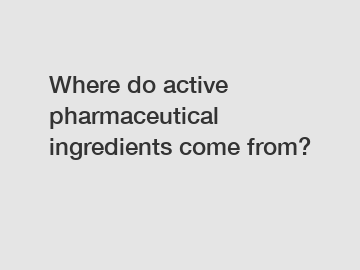Where do active pharmaceutical ingredients come from?
Active pharmaceutical ingredients (APIs) are the key components in any medication. They are the biologically active part of the drug that produces the desired effect in the body. But have you ever wondered where these crucial ingredients actually come from? In this blog, we'll delve into the fascinating world of API sourcing and explore the journey these ingredients take before ending up in your medicine cabinet.
APIs can come from a variety of sources, including plants, animals, minerals, and synthetic compounds. One of the most common sources of APIs is plants, which have been used for centuries in traditional medicine. Many modern drugs, such as aspirin and quinine, are derived from plant sources. Plants contain a wide range of bioactive compounds that can be isolated and purified to create APIs with therapeutic effects.
Animals are another source of APIs, though they are less commonly used due to ethical concerns and the availability of alternative sources. Some drugs, such as insulin and heparin, are derived from animal sources. These APIs are usually obtained through a process of extraction and purification from animal tissues.

Minerals are a less common source of APIs, but they can still be used in certain medications. For example, lithium is a mineral that is used in the treatment of bipolar disorder. Other mineral-based APIs include magnesium and iron, which are essential nutrients that can be used to treat deficiencies in the body.
Synthetic compounds are the most common source of APIs in modern pharmaceuticals. These compounds are created in a laboratory through chemical synthesis, allowing researchers to design and produce APIs with specific properties and effects. Synthetic APIs are often more cost-effective and easier to produce in large quantities compared to natural sources.
The journey of an API starts with drug discovery, where researchers identify a potential new drug target and develop a prototype molecule with the desired biological activity. Once a promising lead compound is identified, researchers must then optimize its structure to improve its efficacy, safety, and pharmacokinetic properties. This process involves extensive testing in preclinical and clinical studies to ensure the drug is safe and effective for human use.
After a drug candidate has been validated in clinical trials, the next step is to scale up production of the API to meet the demand for the drug. This involves establishing a reliable and cost-effective manufacturing process that can produce the API in large quantities while maintaining quality and consistency. The manufacturing process must also comply with strict regulatory requirements to ensure the safety and efficacy of the API.
API sourcing can be a complex and challenging process, requiring expertise in chemistry, biology, engineering, and regulatory affairs. Pharmaceutical companies must carefully consider factors such as cost, availability, quality, and regulatory compliance when selecting sources for their APIs. They must also ensure a secure and reliable supply chain to prevent shortages or contamination of the drug.
In recent years, there has been a growing trend towards outsourcing API production to contract manufacturing organizations (CMOs) in countries with lower labor costs and less stringent regulations. While this can help reduce costs and increase efficiency, it also raises concerns about quality control and oversight. Pharmaceutical companies must carefully vet their CMOs and monitor their operations to ensure the safety and efficacy of their APIs.
In conclusion, the journey of an API from discovery to production is a complex and fascinating process that requires a multidisciplinary approach. APIs can come from a variety of sources, including plants, animals, minerals, and synthetic compounds, each with its own advantages and challenges. Pharmaceutical companies must carefully consider these factors when selecting sources for their APIs and ensure a secure and reliable supply chain to deliver safe and effective medications to patients.
For more PMK glycidate, 2-bromovalerophenone factory, 2-bromovalerophenoneinformation, please contact us. We will provide professional answers.
136
0
0


Comments
All Comments (0)